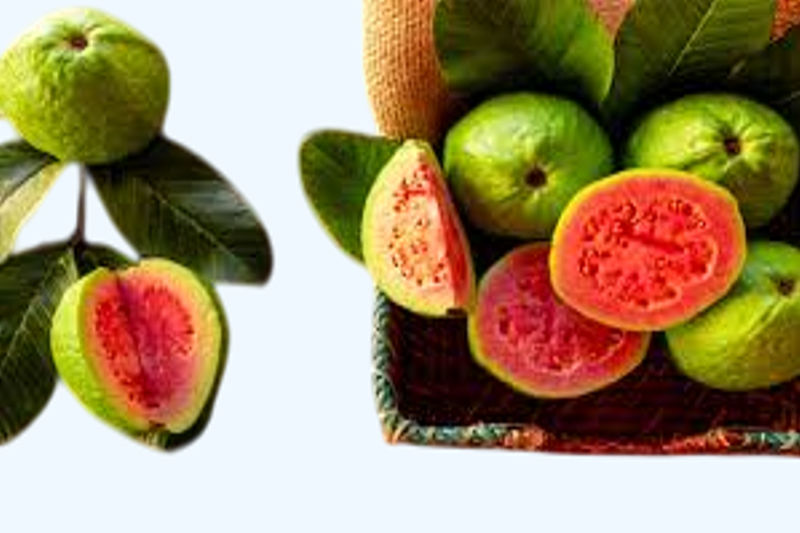Appearance and Uses
Herbal drinks and nutritional supplements frequently contain their leaves. While fresh guava is enjoyed straight from the tree, it can also be juiced or incorporated into jams and pastes.
Health Benefits of Guava
1. Regulates Blood Sugar Levels
Traditional medicine has long utilized guava leaves to help treat diabetes. Research suggests that guava leaf extract enhances insulin sensitivity, improving fasting glucose levels. The dietary fiber in guava, especially when consumed without the peel, may help slow glucose absorption and promote blood sugar regulation.
2. Supports Heart Health
Studies indicate that guava leaf extract may assist in lowering blood pressure. Guava pulp is also good for heart health because it has been demonstrated to lower LDL cholesterol, total cholesterol, and triglycerides.
3. Boosts Immunity
Guavas are exceptionally high in vitamin C, containing significantly more than oranges. About 125 mg of vitamin C, which is found in one guava, boosts immunity and fortifies the body’s resistance to infections.
4. May Have Anticancer Properties
Some studies suggest that guava may inhibit the growth of certain cancer cells while leaving healthy cells unaffected. Although further research is needed, adding guava to a well-balanced diet may contribute to overall wellness.
5. Supports Weight Management
With low calories and high fiber content, guavas help with satiety and maintaining a healthy diet. Each guava contains only 37 calories and nearly 3 g of fiber, making it a nutritious addition to meals and snacks.
6. Promotes Digestive Health
Guavas help with digestion and help avoid constipation because they are a great source of dietary fiber. Additionally, guava extract has been studied for its potential to alleviate symptoms of diarrhea, reinforcing its digestive benefits.
Nutritional Profile of Guava
A 55 g guava fruit contains vital nutrients such as vitamin C, fiber, magnesium, potassium, and copper:
| Nutrient | Amount per Guava |
| Calories | 37 kcal |
| Fat | 0.52 g |
| Carbohydrates | 7.86 g |
| Fiber | 2.97 g |
| Total Sugar | 4.9 g |
| Protein | 1.4 g |
Considerations and Risks
Guava is generally well-tolerated, but excessive consumption may cause digestive discomfort due to its high fiber content. Some studies suggest that guava may lower blood sugar levels, so individuals managing diabetes or taking blood sugar medications should consult a healthcare provider before incorporating it into their diet.
Tips for Enjoying Guava
– Guava glaze pairs well with grilled meats and seafood.
– Eat guavas raw, including the rind and seeds, after washing thoroughly.
– Add fresh guava to salads, smoothies, or frozen treats.
To find ripe guavas, look for ones that are pale yellow-green with pink undertones.
Guavas should be refrigerated until they are ready to consume in order to preserve their freshness.
Final Thoughts :
A tiny but potent fruit, guavas are rich in vitamins, minerals, and antioxidants that support heart and digestive health, blood sugar balance, and weight control. Its high vitamin C content offers extra advantages, such as possible anticancer properties. While guava is generally safe to consume, individuals with diabetes should monitor their intake and seek medical advice regarding its impact on blood sugar levels. Enjoy guava in moderation and take advantage of its incredible nutritional benefits!


